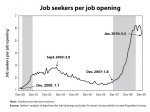Boo Radley
DP Veteran
- Joined
- Dec 20, 2009
- Messages
- 37,066
- Reaction score
- 7,028
- Gender
- Male
- Political Leaning
- Liberal
So you DO blame The Obama, at least in part for the increase in poverty.
Which programs designed to help the poor lift themsleve sor of poverty, have been cut since the 2001 tax cuts?
I actually blame us as voters, and the courts who helped keep the connection between money and politics.
And you have to back further than 2001. This has been a long process. Right now it is no longer about which president or party, as both and all share responsibility. It is about the wrong head ideology that has been moving it this way.
Now I know you seek a Yes, it's Obama's fault as an answer. but that is too simplistic and as such a lie. Put him on the list with everyone else, but at the end of the day it has been this notion of tax cuts again and again that has led us down this path.

 Threads merged.
Threads merged.